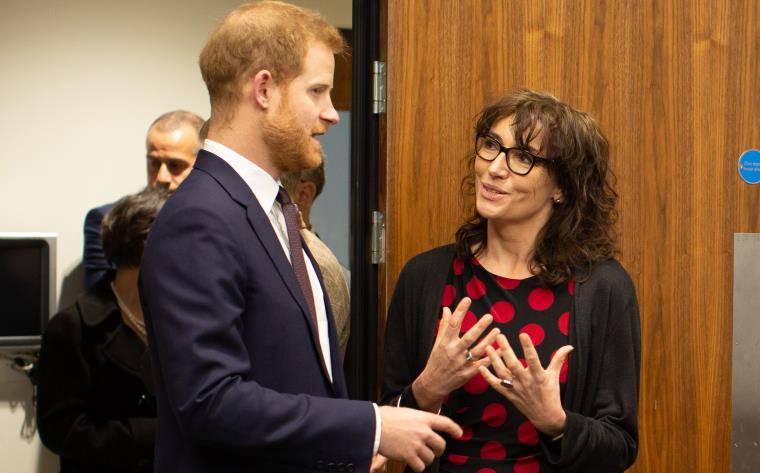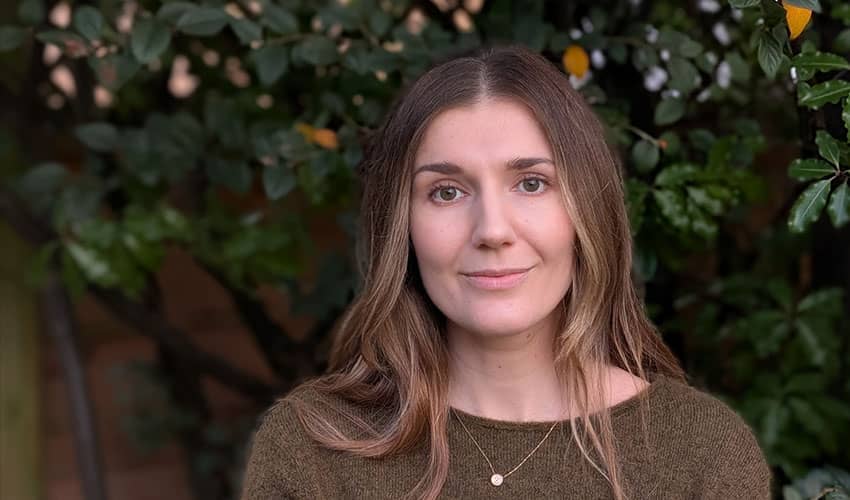HRH The Duke of Sussex meets UWE Bristol academics on visit to conflict wound research centre

Academics from the University of the West of England (UWE Bristol) met HRH The Duke of Sussex during a visit to the world's first specialist military and civilian wound research centre.
Members of the University's Centre for Appearance Research (CAR) discussed the psychosocial impact of disfiguring injuries with His Royal Highness at the centre at Queen Elizabeth Hospital in Birmingham.
The researchers are among the scientific and clinical experts spearheading new treatments at the Scar Free Foundation Centre for Conflict Wound Research, a ground-breaking national facility that aims to minimise the psychological and physical impact of scarring and limb loss among armed forces personnel injured in service and civilians wounded in terrorist attacks.
Scarring and other changes to appearance can have a significant long-term physical and psychological impact on survivors of conflict. More than 6,000 members of the British armed forces have been seriously injured or scarred in recent conflicts. The new centre will support the creation of bespoke psychological interventions to help veterans and their families adjust to living with an altered appearance such as physical scarring (anywhere on the body) or limb loss.
The centre will be piloting tailored psychological treatments to help seriously injured armed forces personnel cope with life with an altered, scarred appearance. This study, run in partnership with CAR, called UNITS (Understanding Needs and Interventions for the Treatment of Scarring), will involve veterans from recent operations in Iraq and Afghanistan, recruited through the CASEVAC Club (which represents injured veterans). The UNITS study also wishes to speak to those injured in all eras of service since 1969.
The UNITS study will be looking to recruit veterans, serving military personnel and their families to better understand and address the psychological needs of those affected by appearance-altering conflict wounds. More than 460 people will take part in the research over the next three years. Armed forces personnel and their families interested in participating in the psychological study can email unitsstudy@uwe.ac.uk to get involved.
His Royal Highness observed a UNITS study workshop with veterans and will have the opportunity to find out more about the study, why participants have chosen to get involved, what they hope to get out of it and their hopes in terms of their own personal recovery.
Professor Diana Harcourt, Director of the Centre for Appearance Research and co-lead of the UNITS study, said: “This is an important issue but until now there has been a lack of research into how we can provide the best possible support for military personnel and veterans who have sustained injuries that have resulted in scarring, loss of limbs or other changes to their appearance. Our three-year programme of research will make a real difference, and we are delighted The Duke of Sussex is so interested in the work we are doing.”
Dr Mary Keeling, a Senior Research Fellow on the UNITS study, said: “We value the collaboration with the CASEVAC club members who are helping us to ensure that our research is accessible to the armed forces community. We're now recruiting into the study and are very much looking forward to speaking to people whose lives have been affected in this way.”
In addition to exploring the psychological impact of scarring and developing new treatments, the centre is bringing together leading scientists and clinicians to investigate the body's healing process following trauma associated with chemical, burn and blast injuries.
Brendan Eley, Chief Executive of the Scar Free Foundation, said: “Scarring not only has a lasting physical effect, but can have a serious emotional impact long after the wounds themselves have healed. The visible changes in appearance caused by conflict injuries that result in looking 'different' can be distressing for military personnel and their families. With the help of the people who have experienced this kind of life changing injury we can learn what support is needed by those affected, and develop tailored interventions for the armed forces community, an important part of our goal to deliver scar free healing within a generation.”
The centre has been established in partnership with the University of Birmingham, University Hospitals Birmingham NHS Foundation Trust, the Centre for Appearance Research, and The CASEVAC injured veterans club. Research at the centre will cost £4.8 million over three years. This is being funded by the Chancellor using LIBOR funds of £3 million – the largest grant announced in the final round of LIBOR funding – alongside an additional £1.8 million from the Foundation's partners, including the Ana Leaf Foundation and JP Moulton Charitable Foundation.
About the UNITS Research Study
The UNITS Research Study is part of the work being carried out at The Scar Free Foundation Centre for Conflict Wound Research. The researchers are looking to recruit serving and veteran military personnel and their families who have sustained an appearance altering conflict injury. The study is led by a team from the Centre for Appearance Research at the University of the West of England in Bristol – the world's largest group of researchers focussing on psychological issues around appearance and body image.
Eligibility criteria for participation in the research study
Military personnel/veterans
- Sustained an appearance-altering (as they perceive it) physical injury in one of the following circumstances:
- During operational deployment and as a result of enemy action, such as blast or gunshot (including burns).
- During operational deployment as a result of an accident, for instance a fall, motor vehicle accident, explosion or fire.
- During field training in preparation for operational deployment.
- Injury sustained during active service (including reserves) in any time-period between 1969 and present day.
- Injury to have been sustained a minimum of one year ago.
- Over the age of 18 years.
- Has capacity to provide informed consent.
Family members
- Over the age of 18 years.
- Related to someone as either a spouse, partner, or parent, who sustained a military conflict-related appearance-altering injury, while serving in the British military between 1969 and present (one-year post injury).
- Has capacity to provide informed consent.
About The Scar Free Foundation
The Scar Free Foundation is a medical research charity, chaired by Professor Sir Bruce Keogh (former National Medical Director of NHS England), whose mission is to achieve scar free healing within a generation and transform the lives of those affected by disfiguring conditions. Founded in 1999 as the Healing Foundation, it has supported over £20 million of life changing research into wound healing and reconstructive surgery.
The Scar Free Foundation Centre for Conflict Wound Research forms part of the Foundation's national, Scar Free Strategy aimed at delivering new scar free treatments within a generation. This programme will be supported by its £24 million Scar Free Appeal, Chaired by Lord James Bethell.
Related news

16 February 2026
UWE Bristol researchers awarded grant to explore impact of asset recovery on offenders
UWE Bristol academics have been awarded funding to explore of the impact of asset recovery on deterring offender behaviour and disrupting crime networks.

10 February 2026
Work by UWE Bristol lecturer features in Government’s National Cancer Plan
Work by a UWE Bristol academic has been included in the Government’s National Cancer Plan.

23 January 2026
On-demand minibus services beneficial in rural areas but face financial challenges, trials suggest
Trials of ‘demand responsive transport’ minibus services boosted connectivity for people in rural and suburban areas, according to a new report produced by UWE Bristol researchers.

18 December 2025
UWE Bristol professor appointed National Institute for Health and Care Excellence CEO
Jonathan Benger CBE, Professor of Emergency Care at UWE Bristol, has been appointed as the new chief executive officer of the National Institute for Health and Care Excellence (NICE).

17 December 2025
Findings revealed from first UK study into experiences of mothers who are survivors of rape pregnancy
UWE Bristol academics have revealed the findings of the first UK-based study of the experiences of mothers who are survivors of rape pregnancy.

11 December 2025
Social media influencer work is far more demanding than it looks, research finds
A study exploring the mental health impacts of social media influencer work has revealed that life online is far more demanding than it appears.

25 November 2025
UWE Bristol experts join film Q&A exploring music and melodrama
Academics will take part in the Cary Comes Home Festival, with a post-screening Q&A exploring music, melodrama and emotional storytelling in classic cinema.

17 November 2025
Urgent reform needed to support ambulance-delivered end of life care, study finds
More than three quarters (78 per cent) of paramedics sometimes fear doing the wrong thing when caring for people in the last year of life, new research has found.

13 November 2025
Bristol’s screen industry experiences “boom-and-bust cycle” after post-pandemic recovery, new research from UWE Bristol finds
New research from UWE Bristol provides detailed insight into Bristol's screen sector.

13 November 2025
New AI research to revolutionise animal welfare
A UWE Bristol research project will combine behavioural science and AI to create technology that understands not only what animals do, but how they feel.

10 November 2025
Lessons from Low Traffic Neighbourhoods will drive better public engagement, study finds
Lessons from Low Traffic Neighbourhoods have informed a new toolkit to improve engagement with the public on challenging local street issues.

06 November 2025
First-of-its-kind study aims to help more people spend their final days at home
A new study will explore how architectural design could support end-of-life care in domestic settings.






